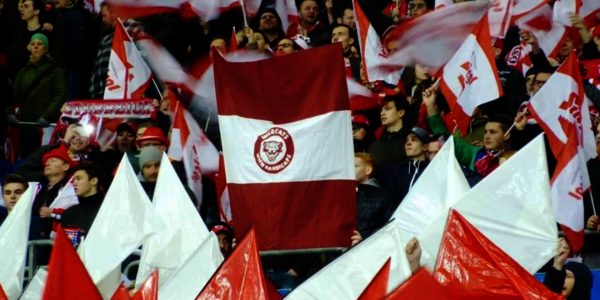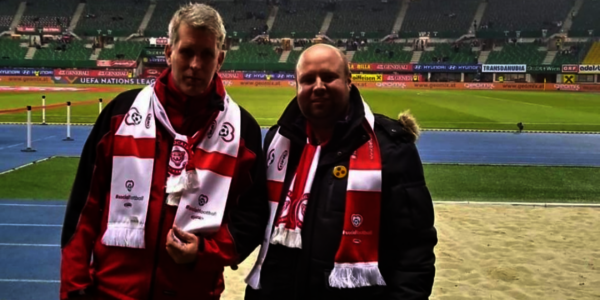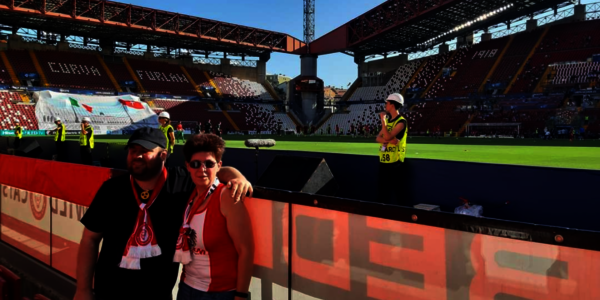Portrait series: Clear the stage for diverse & inclusive associations! #1
fairplay would like to put those clubs and initiatives in front of the curtain that are working for more diversity, inclusion and anti-discrimination in their club and environment in their everyday life. To pay respect for the enormously important work that is done here in and through sport, to empower others and to create role models.
Part 1: the WILDCATS with HANDICAPS!
Author: Tobias Fries
Hearing game
Christoph Lagler is blind and stands in the fan curve at every match of the Austrian national team. Instead of settling for a separate seat for the disabled, he has always wanted to go where the atmosphere is. A visit to the stadium of a not-so-different kind.
It is one of those wintry autumn days when Christoph Lagler finds himself at his seat in the Ernst Happel Stadium. He is in the front row of the Austrian national team's fan section, sector D, tiers eleven to twelve. Not many fans found their way to the Praterstadion today. At about two degrees on a Sunday evening in late November, only every fourth seat is occupied, 18,000 spectators have come to watch against the reigning European champions Italy. A few hours before the friendly match, the World Cup in Qatar had opened, for which neither national team had qualified.
But Christoph Lagler prefers to be here anyway. He describes himself as a "child of the curve" and is live in the stadium at almost every Austrian home game. He has even founded a fan club, with which he is also there this evening. Things went well for Ralf Rangnick's team against Italy right from the start, with Xaver Schlager taking the lead in the 6th minute. After that, the ÖFB team continues to create chances, Lagler also takes it, when things usually don't go so well against the neighbours. When Marko Arnautovic again dribbles with the ball near the Italian goal, he shouts: "Go ahead and shoot". Most fans in the stadium see Arnautovic miss his chance to score. It's different for Lagler. He couldn't see the scene at all. He got it described to him through the headphones he wears the whole game. Lagler is almost completely blind and is the chairman of the "Wildcats with Handicaps" - a fan club for the disabled.
Even when Lagler was born, he had only 30 per cent vision. But with the help of glasses or contact lenses, he could at least read a book - or go to the stadium. He grew up as a sighted fan in the curves, "like everyone else," he says. "Except that I could only see up to about the halfway line." Whether he would have seen more in the straight stands, he doesn't know: "I don't think I ever tried that. I only know fan sectors." Then, at 26, Lagler's eyesight deteriorated badly. Today he can only distinguish light and dark.
But that doesn't stop Lagler from going all out in the stadium. Against the Italians, he is just as much a part of the action as the other fans in the Austrian curve. He jumps, sings, claps and even complains about the referee if he has to. His device, which he uses to receive the audio description of a reporter for the blind from the ÖFB, is not working properly today. Through the noise, however, he can still hear when a decision worthy of discussion has been whistled.
Lagler would not have had this stadium feeling if he were sitting in a separate area for disabled people. That's why, together with Magdalena Klatil, he founded the "Wildcats with Handicaps" in 2016, a fan club for passionate stadium-goers with disabilities. This way, the handicapped can support each other. Not so many came against Italy, rather the "hard core", as Lagler says. Sylvia, a friend of Lagler's, is also there. She has no disability, but accompanies Lagler so that he can find his way around the stadium. He can't use his cane very well here, it's too crowded. Instead, one of the escorts without a handicap hooks up with him and guides him through the stands. All in all, the Wildcats have about 20 members, only six of whom have a disability, the rest are mainly Lagler's friends who go along to the games as escorts.
The Austrian Football Association is aware of the special nature of the fan club. "I don't know of any other comparable fan club or organised group of people with disabilities in Austria," says Ingo Mach, fan and disability representative at the ÖFB. When the Wildcats made the request, they first had to clarify safety issues, but that was no problem. It is still normal for visually impaired people to have to sit in certain seats in the stadium because they are handed a receiver for the audio commentary by fan advisor Mach. But with a new app that the ÖFB plans to use soon, that could slowly change. "With the app, there will no longer be a need for a receiving device that you have to pick up separately," says Mach. "The blind commentary will then run directly via your own mobile phone."
Via the blind commentary, you can follow not only game scenes. Lagler is also very interested in tactics and formations and is a fan of high-quality football. Against Italy, however, his analysis is very simple: "They're not trying so hard today," he says, and a little later he hears David Alaba's free-kick goal that decides the game for Austria. Even though he didn't see it, he is just as happy as the others in the Ernst Happel Stadium. A bit of jubilation is good in the icy temperatures. "A beautiful goal," he says. It was his last visit to the stadium this year.
"People with a handicap might dare to go into the fan sector more if they are not alone".
Christoph Lagler is blind and a fan of the Austrian national team. With a friend who is also handicapped, he founded the fan club "Wildcats with Handicaps". In the interview, he tells us how they came up with the idea of a fan club for handicapped people and what challenges there are when going to the stadium with a handicap.
fairplay: Why did you found the fan club "Wildcats with Handicaps" together with Magdalena Klatil?
Christoph Lagler: After the 2016 European Championship in France, Magdalena and I had the idea of founding a fan club to get into the first rank in the curves. And because we both have a disability, we thought we'd make a fan club for people with disabilities. That way, disabled people might dare to go into the fan sector more because they are not alone. Unlike in Germany, for example, there has never been a fan club for people with disabilities in Austria.
Normally, disabled people are in separate areas in the stadium. Why not you?
I watched it twice, but it just wasn't for me. I grew up in the curves, I only know fan sectors. I want to be where the atmosphere is, stand for 90 minutes, get excited if I have to. So we founded the Wildcats and applied to the ÖFB.
How did the ÖFB react?
From the beginning, the project was actually received very, very positively. We are not treated any differently than other fan clubs. There is no reason for it, because the ÖFB does not really have more trouble with us.
The stewards in the sector are informed in case the stadium has to be evacuated, said ÖFB fan representative Ingo Mach. What other challenges does a disabled person face in the stadium?
Actually, none that I don't have in everyday life. Of course, there are more people in a smaller space in the stadium and I can't use my cane. But that's why we always have companions without disabilities with us to help us. I am then led to my seat and later out of the stadium.
At which national team games are the Wildcats present?
We are represented in some form at all home games. We have also been to the U21 European Championship in Italy. Next year I'd like to go to Belgium for the 2024 European Championship qualifiers, let's see how many sign up for that. If Austria qualifies for the European Championship in Germany, I will of course put down two weeks' holiday straight away.
Can anyone become a member of the Wildcats?
In principle, yes. The prerequisite for the membership price for people with disabilities is a disability pass. We are happy to help wheelchair users buy tickets, but unfortunately they can't get into the sector with us because it is not barrier-free. We currently have about 20 members, six of whom have a disability, the rest are mainly friends of mine who go along as companions. We are currently looking for more disabled members, but it's not that easy.





